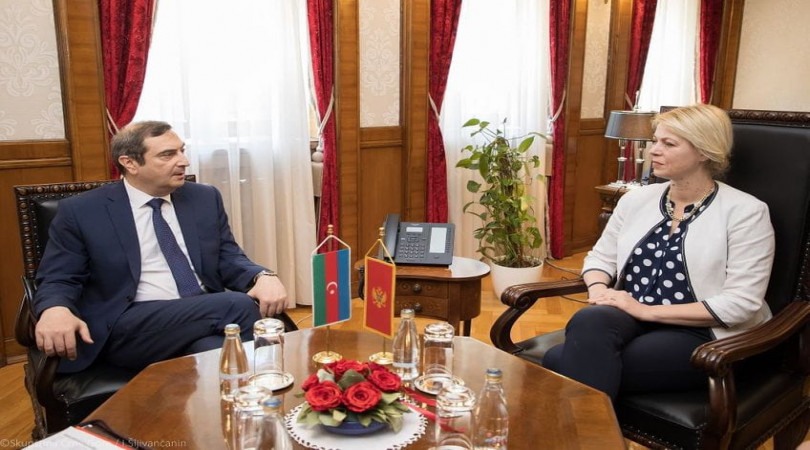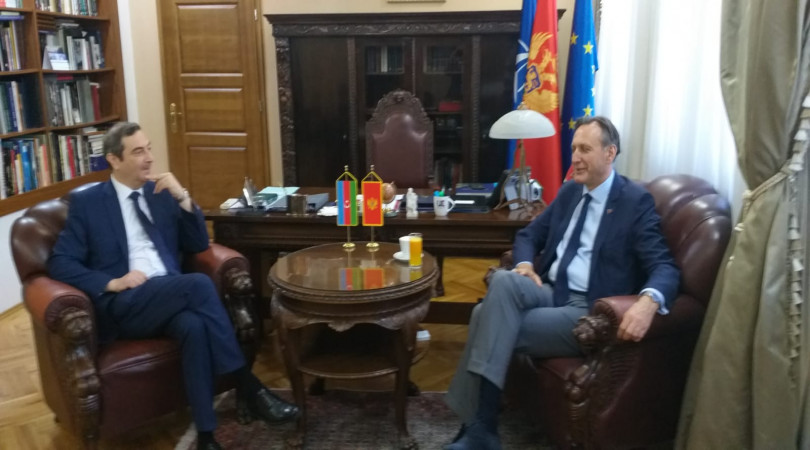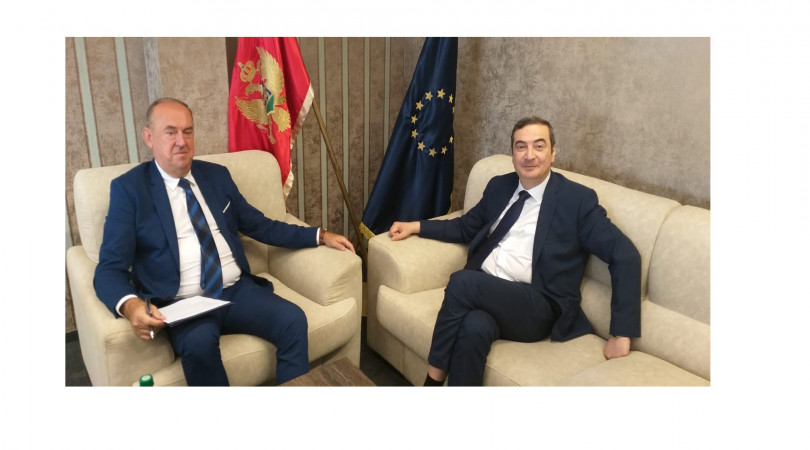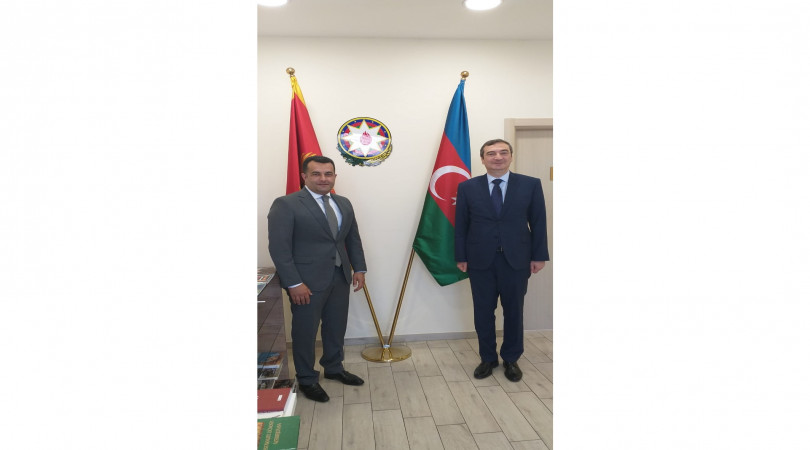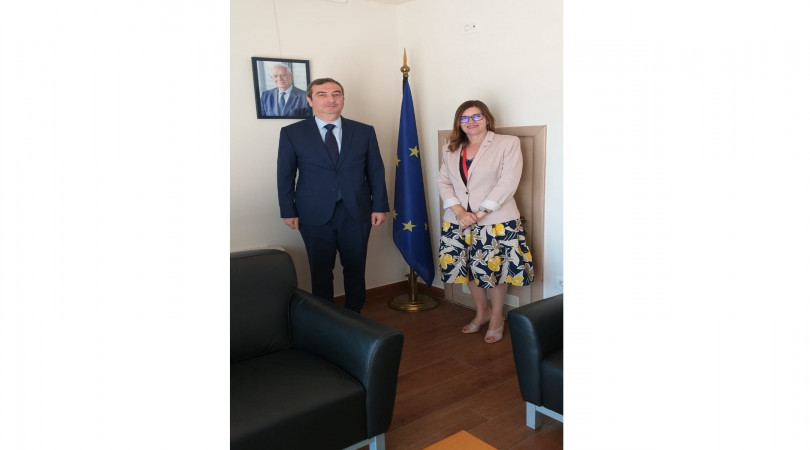Sixth Ministerial Meeting of Southern Gas Corridor Advisory Council held in Baku President Ilham Aliyev attended the meeting
The 6th Ministerial Meeting of the Southern Gas Corridor (SGC) Advisory Council has been held at the Heydar Aliyev Center in Baku.
President of the Republic of Azerbaijan Ilham Aliyev attended the meeting.
Prior to the meeting, a joint photo was taken.
The head of state made a speech at the event.
Speech of President of the Republic of Azerbaijan Ilham Aliyev
-Dear ladies and gentlemen, dear guests, welcome to Azerbaijan. I am very glad to see all our guests who came to participate in the 6th Meeting of the Advisory Council of the Southern Gas Corridor. First of all, I would like to express gratitude to the governments of the countries, whose representatives together with us attend this meeting, for sending their high representatives to attend the 6th annual meeting. Azerbaijan as an initiator of this form of cooperation is very proud that during the years the Advisory Council transformed into a very efficient and working mechanism which consolidates our efforts in implementation of this huge mega project of Southern Gas Corridor. We are grateful to all our partners first of all the partner countries, members of the southern Gas corridor-Georgia, Turkey, Greece, Bulgaria, Albania, Italy-the countries which are very close partners to Azerbaijan and I remember my numerous meetings with the heads of state and government of these countries. Only this year in two months of this year my meeting with heads of state and government of Turkey, Italy, Georgia also demonstrate our close partnership. Three days ago the President of Turkey was our guest, and we discussed what has been achieved in this respect and our future plans. A week ago, being on a state visit to Italy during my meetings with President and Prime Minister of Italy we discussed this important project and in the end of January my meeting with the Georgian Prime Minister also allowed us to review the achievements and plan our future steps. I think this unique composition of countries, members of the Southern Gas Corridor demonstrates that common goal can unite the countries. I am sure that after the Southern Gas Corridor project is completed our multilateral cooperation will continue in other areas. I also would like to express gratitude to the governments of the United States and United Kingdom for their continuous support to the projects which Azerbaijan initiated. This support started in the mid 90s, when Azerbaijan opened its oil and gas potential to foreign investors. Azerbaijan was the first country in the Caspian region that allowed foreign companies to invest and to have petroleum operations in the Caspian and during all this time of more than 25 years governments of United States and United Kingdom with close partnership with Azerbaijan delivered a great contribution to implementation of such a huge projects like Baku-Tbilisi-Ceyhan oil pipeline, Baku-Tbilisi-Erzurum gas pipeline and the Southern Gas Corridor.
I am very glad to see high representatives of our partner countries. I also would like to express gratitude to the European Commission. The European Commission and Azerbaijan back in 2011 signed here - in Baku a Joint Declaration on the Southern Gas Corridor, which actually was the starting point of implementation of this project. In that declaration we clearly stated that this is a strategic project and we will spare no efforts in implementation of the project. I would like to express personal gratitude to former president of European commission Mr Barroso, with whom we signed the document in Baku back in 2011. He visited Azerbaijan twice. And also to former president of the European Council Mr. Tusk who also visited Azerbaijan twice and last time was last July and who played also very important role in strengthening cooperation between EU and Azerbaijan and also in the area of energy. Also, I would like to say that we are very grateful to former European Commissioner Mr. Oettinger, the first European Commission official who was deeply involved in the implementation of this project. And also vice-president Mr. Sefcovic, who is now continuing his duties as vice president but is now involved in another sector. But while working with us on the Southern Gas Corridor he was always with us at the annual meeting and really our cooperation led to a very tangible results. Of course, I would like to mention the international financial institutions, which helped us to implement this project- World Bank, EBRD, Asian Development Bank, European Investment Bank and other banks, also private banks. Without their support the implementation of the project would not have been possible. So, in other words, we established a really unique format of cooperation where Azerbaijan as the initiator of the project as an investor and the host country launched this initiative. This initiative was supported by our neighbors, Turkey and Georgia, the countries with which we have implemented previous important energy transportation, infrastructure projects. Then new partners, 3 of them members of the European Union, Italy Greece and Bulgaria and also Albania. And then new partners and potential partners, the countries with which we have signed Memoranda of Understanding-Bosnia and Herzegovina Croatia and Montenegro. And also, today at this table we see representatives from Hungary, Romania, Serbia and Turkmenistan. Their presence today show that they are also interested in this project. I think that in the coming years we will strengthen our cooperation and will create maybe broader format of cooperation between all our countries and maybe even those countries which are not present today will join us next February.
I would like to use this opportunity to invite all of you to be here, to be our guest next February, because the completion of the construction of TAP I think does not mean the completion of our team work. A lot of things I think must be reviewed, next February here in Baku and then we will elaborate our strategy for the future. Last February we reported about successful completion of the part of TANAP, which reached the Turkish market, in June 2018. And this time we proudly report about the completion of TANAP which reached already Turkish-Greek border. This is a very important milestone implementation of our mega project. Today when Southern Gas Corridor completion is very high, and you know very well that completion of TAP project is around 92 percent, and hopefully, by the end of this year we will celebrate the inauguration of the Southern Gas Corridor.
Of course, after all our efforts brought very tangible results when we look back, it’s even difficult to imagine what was the challenges in front of us, in front of Azerbaijan back in the beginning of our independence and it was even not possible to imagine that one day in less than 30 years a country will achieve together with international partners such a great success and we will initiate and together with the partners successfully implement projects of global interest and global scale. Each of them Baku-Tbilisi-Ceyhan, Baku-Tbilisi-Erzurum, ACG, Shah Deniz, other exploration production projects, Southern Gas Corridor, I would also add transportation project like Baku-Tbilisi-Kars each of them is of a strategic importance. Each of them will provide sustainable, successful and I am sure prosperous development for our country and our people and all the countries which are involved in this project. But, back in 1991, situation was completely different, as a result of the collapse of the Soviet Union Azerbaijan became independent. But unfortunately country could not provide decent life for its people. İt was a total poverty, stagnation of economy and chaotic situation, which led to a lot of complications and big losses. Situation even more deteriorated in 1992, when as a result of the military coup the so-called Popular Front came to power. That was the time of disaster I would say, because one year in power brought Azerbaijan to the verge of collapse. Economy was totally destroyed, widespread corruption actually was the undermining factor of our newly acquired statehood. Inflation was more than one thousand percent. Armenian occupation and a million of refugees at that time I think, we were number one with respect to refugees per capita. Civil War, which Popular Front government launched while Armenian forces were occupying part of our territory this corrupt regime launched a war between Azerbaijanis. And actually, newly acquired statehood was at risk. The people of Azerbaijan, demonstrated the wisdom and courage and wiped out that anti-national regime and invited Heydar Aliyev to Baku. Since October 1993, when Heydar Aliyev was elected as a President, Azerbaijan started to go on the path of stability, development and progress. So, since that time our country lives in the situation of political, economic and social stability. Taking into account situation in our region, situation in the world, we see new conflicts, new areas of confrontation. Unfortunately, the number of conflicts is growing. I think living in the stable, secure environment is one of the main achievements of our policy.
And of course, one of the main ways how to build a state was to establish a strong economy. And without foreign investments it was not possible. Therefore, it was very clear that we need to attract foreign companies to invest. But where? The only area where foreign companies could show interest was oil. But Azerbaijan was considered a very risky place, foreign companies’ representatives felt themselves very uncomfortable here, there was even no normal hotels for them to stay. And of course, under these circumstances to attract the investments was not an easy task. But we managed to do it and in September 1994, Azeri-Chirag-Gunashli fields were contracted by Azerbaijan, and the consortium of foreign oil companies. That was the beginning of our path to the progress, prosperity and development.
Therefore, oil factor in the modern history of Azerbaijan played crucial role. In the past when Azerbaijan was not independent, and as you know the first oil was extracted in Baku and the first well in the world is situated maybe ten kilometers from here. But our people did not take advantage of that, because during the times of when Azerbaijan was not independent, more than one billion tons of oil was extracted. If Azerbaijan was independent at that time, today we could have been one of the richest and most prosperous countries in the world. But those natural resources did not serve the interest of Azerbaijani people. Only when we became independent that happened. And today’s Azerbaijan is a clear example of that. Therefore, what happened in 1994, signing of “Contract of the Century”, was not only a commercial project. That was a project for us to survive. That was a project for us to strengthen our statehood, our economy, to provide better life for our people. And that all happened. And in our case oil was not a curse. Oil was the means, one of the most important means, to succeed and to build a strong country, to provide normal life for the people, to live in stability, in security and in harmony with our neighbors. After that the interest in Azerbaijan grew, and in 1996 Shah Deniz contract was signed. At that time gas factor was not so important for energy security of the countries. Therefore, signing of Shah Deniz was not considered to be as important as signing of ACG back in 1994. But today’s reality shows how wise it was to do it on time. Then in 1997, the first oil from the contracted area was extracted and in this respect I think there was also a record. Because usually with foreign investments the time between the signing of the contract and extracting the first hydro-carbon is much longer than three years. In our case it was three years. And that allowed us to start to invest in other sectors of our economy. In 2002, the decision to build the major oil pipeline already was implemented because the practical construction of Baku-Tbilisi-Ceyhan pipeline has started. Before that Baku-Novorossiysk and Baku-Supsa, two pipelines, which delivered our oil to Russian, Georgian and Black Sea ports were already commissioned. Therefore, inauguration of Baku-Tbilisi-Ceyhan in 2006 was another milestone in development of our country, because after that we started to receive revenues and we started to invest in infrastructure, and in human capital. Then in 2007 Azerbaijan became for the first time international gas exporter. Baku-Tbilisi-Erzurum gas pipeline was inaugurated. We consider that most of what we have planned have been successfully implemented but the new challenges were in front of us. We needed to start the full scale development of Shah Deniz, Shah Deniz phase 2 project. And without that, without the major gas pipeline system that was not possible. Therefore, consortium was waiting for us, to reach an agreement with partners to make a final investment decision and we did that. In 2012, Azerbaijan and Turkey signed agreement on construction of Trans-Anatolian Pipeline-TANAP. Before that as I said prior we signed joined declaration with European commission in 2011, and after that international consortium made a final investment decision on Shah Deniz 2 and the practical construction started, which was conducted very successfully. And in 2018, we already announced the official opening of the Southern Gas Corridor here in Sangachal terminal and in June, TANAP reached the Turkish market. Last November as I said already, TANAP was on the European border, and implementation of TAP is 92 percent. So this is a success story of all of us.
I think that the Advisory Council played an instrumental role in the implementation of this project because we not only meet every year in Baku. During the year numerous meetings, consultations, and important decisions have been made in order to move the project forward. Azerbaijan also became during this time a reliable transiter, not only supplier but transiter. Countries situated on the eastern shores of the Caspian Sea transport their hydro carbons through Azerbaijan to international market. And also oil produced by Russian companies in the Russian sector of the Caspian Sea is being transported through our system, through Baku-Tbilisi-Ceyhan to international markets. So, we are already a transiter. Our role as a transiter I am sure will grow. That also stimulated the rapid development of the transportation sector of Azerbaijan, which today is very modern, efficient and which will help us to strengthen our position as a Eurasian transportation hub. We have the biggest fleet in the Caspian, more than 200 vessels. We have a brand new shipyard, which can produce and produces necessary vessels for us and also for a consortium. We have built six international airports. One of them is the Heydar Aliyev international airport, a five star airport, one of only ten five star airports in the world. We modernized our railroad system, and this process continues. According to Davos World Economic Forum assessment, we are number 12 in the world in terms of efficiency of railroad. Efficiency of Azerbaijani airlines is number eleven in the world, the quality of roads we are number 27 in the world and the quality of infrastructure number 34. So, transportation sector development was very rapid, and now Azerbaijan is the only country which participates and actively invests in the creation of the East-West and South-North transportation corridors. Actually today we are already talking about the North-West transportation corridor which crosses our country and the South-West transportation corridor which is not yet commissioned but it has a potential. Also, I would like to say that ACG and Shah Deniz are not the only big assets of Azerbaijan. Though it’s really a big asset because the very fact that Azerbaijan and BP signed an agreement to prolong the contract from 2024 up to 2050 shows that the potential of ACG is really huge. If in the early times we assumed the potential of the field around 500 million tons, now it’s much above 1 billion tons. I am sure the new technologies will allow to extract even more. Our proven gas reserves are 2.6 trillion cubic meters and prognosed reserves are around 3 trillion cubic meters. Therefore, for more than hundred years Azerbaijan will be a reliable supplier of hydro carbons. Today with our traditional partners, with BP who leads the Shah Deniz consortium and ACG consortium and is our strategic partner, we work on such a project like as it called “D 230” which entered in force in 2018. Together with BP we work on the field which is called Shafag-Asiman and the first well is to be drilled very soon. Also with BP we work on the project which is called “Shallow Water” with a huge potential of undiscovered huge deposits because they situated very close to the shore and our traditional production place was off shore. Next year we will start production of gas with Total from Absheron field which is the capacity of 300 billion cubic meters. SOCAR is actively developing Umid-Babak field. Now the daily production from Umid is 3 million cubic meters of gas, and the potential of this field is more than 200 billion cubic meters. Together with Equinor we are jointly working on Garabagh field. The appraisal well as far as I was informed is to be drilled very soon. So, these are all the potential of Azerbaijan in the future. Plus, deep gas in ACG as a huge deposits, and negotiations between SOCAR and BP is going very successfully. Hopefully soon we will come to an agreement. So, all that will contribute to the implementation of our strategic goals, expanding our presence on international markets, exporting hydro- carbons in a diversified way, and creating better conditions for our people. This is our goal and the strengthening of our state.
In a meantime, we worked very actively on fair distribution of wealth because in many oil-producing countries the gap between the rich and poor is very high. So, our main goal was to transform black gold, as we call oil, into human capital. The very fact that during the last 16 years level of poverty in Azerbaijan dropped from almost fifty percent to 4.8 percent shows that really economic growth and oil and gas projects help the people to live better life. Our economy grew during this time 3.4 times. This is a world record. Our foreign trade during the last 16 years grew 6.4 times. Our direct foreign debt is only 17 percent of GDP, and our hot currency reserves are 6 times bigger than our debt in other words, we can level the foreign debt whenever we want. So these are the major economic data. Last I would add that World Bank considers Azerbaijan among the 20 most reformist countries in the Doing Business program. This January Azerbaijan and Davos World Economic Forum signed a letter of intent on the creation of the Davos Fourth Industrial Revolution Center in Baku. This is a regional center which will cover the Caucasus and Central Asia and Azerbaijan was selected because our industry, our non-oil industry grows rapidly. Only last year, the growth was around 14-15 percent in non-energy industry and this year we hope will be more or all the same.
Of course, talking about oil and gas projects we always talk about energy security. Azerbaijan is a country which provides energy security for itself and for its neighbors. Energy resources’ diversification is one of the important issues. And here of course, diversification of sources is the most important issue. In our case is diversification of sources and diversification of goods. I also think, one of the main reasons of our success is the balance of interest- the balance between producers, transiters and consumers. I am sure that this positive format of cooperation between us will continue and I wish the Council success. Thank you very much.
X X X
Deputy Director-General of the Energy Directorate of the European Commission Klaus-Dieter Borchardt then addressed the meeting.
X X X
The meeting continued with panel sessions.

